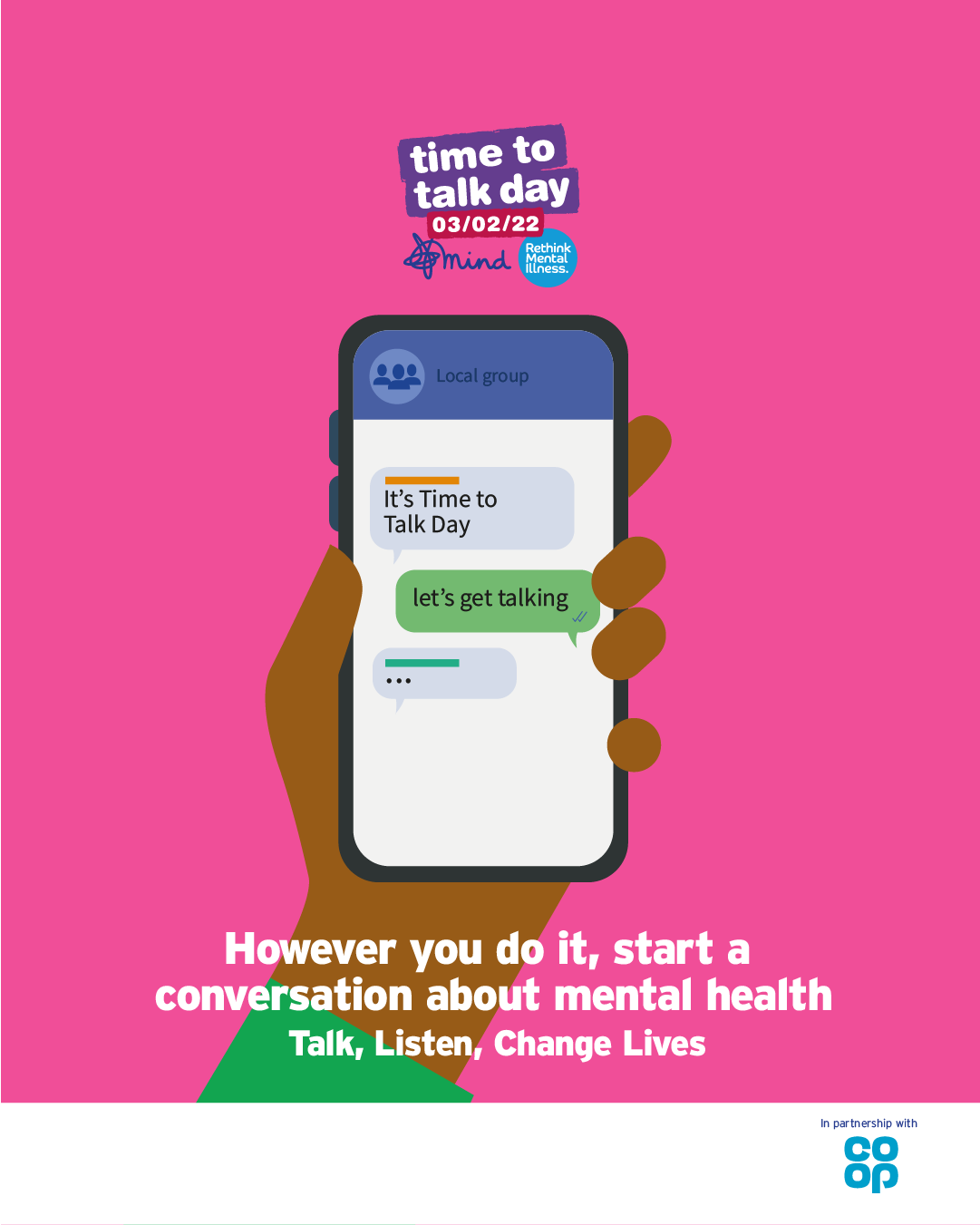
Ask DadPad, Mental Health
Ask DadPad: How do I start a conversation about mental health?
Posted on 4th February 2022
Yesterday was Time to Talk Day, an event run in England by mental health charities and campaigners Mind and Rethink Mental Illness, in partnership with the Co-op. The aim of the awareness day is to encourage us to have conversations about mental health with those around us – be they friends, family members or work colleagues – in order to create supportive communities.
Obviously, we’ve already written quite a few blog posts focusing on mental health, and many of these have highlighted the importance of speaking with others about your worries, your concerns and your emotions.
Back in summer 2020, for example, we spoke to a number of leading campaigners working in the dads’ mental health field about ways in which new fathers could best support their own and their partner’s mental health during the all-important perinatal period (the period which runs from conception – the moment your partner becomes pregnant – until your baby’s first birthday), and one section stressed the importance of opening up to others:
It’s also important to talk to those around you – including, of course, baby’s mum – about what they should be looking out for in you. Kieran [Anders, from Dad Matters UK] encourages dads-to-be and new dads to “keep open the lines of communication with the people closest to you to recognise possible changes in [your] behaviour.”
This period of your lives will be a huge test of your relationship – Kerry at PANDAS comments: “…the mental endurance test of supporting a pregnant partner through pregnancy, birth and beyond is testing” – and strategies that the two of you come up with to help deal with this will not only be beneficial to you both, in terms of building a strong, long-lasting relationship, but also for your family’s future wellbeing. Be open to the fact that “having a new baby can be stressful and often adds to a lot of mixed emotions within the family unit… [and remember that], by speaking with your partner about your worries, this is the first step in reducing your risk of further mental health deterioration” (Kelly Arnold – perinatal mental health professional from Betsi Cadwaldar University Health Board).
We also have a blog written last summer by DadPad’s Georgie which focused on flagging up what to do and where to go if you feel that you need support for your mental health. Within this article, Georgie again highlighted the importance of speaking with others about your concerns:
- Express your feelings: Don’t bottle things up! By noticing how you feel and trying to put it into words, you are creating the space to deal with those feelings appropriately and to be supported by others. Often we only express our feelings when we are triggered into a reaction, which isn’t helpful for ourselves or others around us.
- Keep in touch: Everyone has busy lives but keeping in touch with family and friends is essential to our mental wellbeing, can reduce feelings of isolation and creates regular opportunities to share how you are feeling.
- Ask for help: A problem shared is a problem halved; asking for help does not make you weak or a failure. Reaching out can feel difficult, though, especially if you are used to being the one everyone usually comes to for advice and support.
Why Time to Talk Day matters to new dads…
We now know that experiencing perinatal and/or postnatal mental health difficulties is not unique to mums, with statistics indicating that a similar proportion (around 1 in 10) of new dads will also experience postnatal depression.
Not only will new parents – yes, dads too – experience a shift in hormones which can contribute to a potential downturn in their mental health, but they’ll also have to cope with:
- existing environmental factors, such as job security, income, housing, having supportive(or not) family nearby (or not), etc;
- situational changes, such as lack of sleep, added responsibilities, increased worry about all sorts of things, dealing with your wider family, etc; and
- psychological factors, such as previous mental health, coping skills, etc.
Consider all of these, plus the potential loneliness experienced by many new parents, suddenly finding themselves ‘stuck’ at home with a challenging new baby, and you can see why – in our view – all new parents should be seen as being potentially vulnerable to developing a mental health condition during the perinatal period. That’s why we include information in the DadPad and DadPad app on things for dad to look out for in mum, and also for him to look out for in himself. We also always encourage either partner to seek help at the earliest opportunity if they believe that either of them are struggling.
However, as an individual experiencing some degree of difficulties with their mental health, actually reaching out to someone to say “I think I need help” can be incredibly hard to do. This is why it’s so important for those of us around the new family – whether as a healthcare professional, a friend, a work colleague or a family member – to be alert to the possibility that one or both of them might be struggling. This is one reason why the Time to Talk initiative is so important as, having the confidence to offer someone the opportunity to chat about and offload a little of how they are feeling could be an important first step in them receiving the support that they need in order to be able to recover.
As stated on the Time to Talk Day website:
Talking about mental health reduces stigma, helping to create supportive communities where we can talk openly about mental health and feel empowered to seek help when we need it.
That’s why opening up the conversation about mental health problems is so important – by talking about it we can support ourselves and others.
Further, there’s also a new campaign from Public Health England, encouraging us to “Lift someone out of loneliness” by:
…carrying out small acts of kindness to help someone who may be feeling lonely, knowing that this is likely to help them feel less lonely too. Fancy a cuppa? Fancy a walk? Sometimes reaching out to each other with as little as three words can make a big difference.
It’s fantastic to see that the materials supporting this campaign identify new parents as one of the groups who may be at higher risk of experiencing feelings of loneliness.

But how do I do it? Where do I start?!
Most of us already know that it’s important to reach out to those around us, to check that they’re doing ok, and to know that we’re here for them if they need to talk. But probably just as many of us feel incredibly nervous about making that offer to someone who might actually be feeling depressed, or mentally unwell. After all, what do we say? How do we react? And what happens if we say or do something that actually makes things worse?!
This is where the Time to Talk website comes in handy, as it sets out five key tips to help give us some ideas on how to approach things in the right way:
1. Ask questions and listen
The website says:
Asking questions can give the person space to express how they’re feeling and what they’re going through, and it will help you to understand their experience better. Try to ask questions that are open and not leading or judgmental, like “how does that affect you?” or “what does it feel like?”
One of the key pieces of advice that we always repeat here at DadPad is that – when visiting a new family – not to forget to always check in on dad. Most people are aware of the fact that mum might be struggling; after all, she’s just been through a hugely challenging physical experience, will be in the midst of riding a hormonal rollercoaster AND be learning how to be a mum, as she gets to know her newborn. Experiencing ‘baby blues’ and/or postnatal depression is also a widely known phenomenon in new mums, so the healthcare professionals around her will be keeping a close eye on that aspect of her health.
However, lots of people – both professionals and others – will still overlook dad and how he is coping with everything. As stated earlier in this blog, it’s now accepted that dads are just as susceptible to developing perinatal mental health conditions as mums. They might also be recovering from their own experience of the birth, too; it’s also becoming more widely known that dads who have had a front-row seat at a tricky or risky birth – where the two people most precious to them in the whole world might go through situations where their own survival is in question – can develop PTSD. Added to this, many dads feel that their own struggles are ‘less important’ than their partner’s, or they might be worried to speak up about how they are suffering for fear of either taking the attention away from mum and baby and/or not being believed or seen as some sort of ‘wimp’.
For these reasons, and more, if you know a new dad, we’d always encourage you to ask the question of him: “How are you?”. And never be afraid to ask that question for a second time. After all, how many times have you responded with a ‘Fine!’, rather than share how you’re really feeling? Giving dad permission to share his feelings with you could be really important…
For more ideas about starting a conversation with someone about their mental health, do also have a look at the blog from Lauren on the Time To Change website: 5 ways to start a conversation about mental health.

2. Think about the time and place
Sometimes it’s easier to talk side by side rather than face to face. So, if you do talk in person, you might want to chat while you are doing something else. You could start a conversation when you’re walking, cooking or stuck in traffic. However, don’t let the search for the perfect place put you off!
This is great advice, as it can sometimes feel a bit intense, sitting opposite someone and sharing your feelings, and it might be easier to open up without making eye contact with the person you’re chatting to.
The Lift Someone Out of Loneliness campaign identifies some relatively straightforward and simple ways of connecting with someone who might be feeling lonely, including:
- Checking in with a family member, friend or neighbour by sending a text or giving them a call to see how they’re doing
- Reaching out to someone to suggest catching up over a tea or coffee
- Inviting someone to join you in getting some fresh air and going for a walk
Just like a new mum, a new dad might also welcome the opportunity for a walk, if he’s been ‘stuck at home’ for a while with his new family, and this might be a chance for him to also share a little of how he is coping with all the changes happening to him right now. And we know that exercise is also a good thing for our mental health, too, so that’s another good thing!
However, even if you just pop round for a visit, offering to help dad make a cup of tea might also be another chance to at least start the conversation, and to let him know that you’re there if he needs a chat at any point in the future.
Do remember, though, that dad might not have the same flexibility and freedom – or even the willingness – to drop everything and meet up as he did in his pre-fatherhood days. If he and baby’s mum are working hard to support each other to cope with a lack of sleep and/or establishing successful breastfeeding, for example, then inviting him out for a few pints at the local might put additional stress onto mum, or he might not have the energy for that sort of thing right now. Instead, try and accommodate his current lifestyle into your offer to chat and support him.
3. Don’t try and fix it
It can be hard to see someone you care about having a difficult time but try to resist the urge to offer quick fixes to what they’re going through. Learning to manage or recover from a mental health problem can be a long journey, and they’ve likely already considered lots of different tools and strategies. Just talking can be really powerful, so unless they’ve asked for advice directly, it might be best just to listen.
This advice will come as a huge relief to many of us, as we might think that starting a conversation means that we’re also implying that we can help in some way. However, recognising that just being there, enabling your friend to be heard, can – in itself – be a massive support for them.
This was emphasised to us by two experts in one of our earlier blog posts, with Kieran from Dad Matters saying that “Acknowledging how you’re feeling before you get to the point of needing professional support means that you’ll be less likely to need professional support” and perinatal mental health professional Kelly Arnold from Betis Cadwaldar University Health Board adding that “…being open about how you are feeling about your new baby or any worries that you have will be the first step in making those worries a little less overwhelming.”
If they do ask you for help or solutions, though, then why not share with them the link to our “Where do I go to access support for my mental health?” blog, which has lots of information and links to sources of advice and support?
4. Treat them the same
When someone has a mental health problem, they’re still the same person as they were before. And that means when a friend or loved one opens up about mental health, they don’t want to be treated any differently. If you want to support them, keep it simple. Do the things you’d normally do.
This is definitely a ‘biggy’, especially as – for so many people – there can be a stigma around admitting to having mental health difficulties. If someone’s taken the brave step of reaching out to you, or disclosing a little of how they’re feeling, the last thing they want is for you to then make them feel that they’ve damaged your relationship in some way. So don’t ignore them, or avoid them, or do anything to lead them to believe that you no longer feel the same way about them.
It might feel a little scary for you, but do try and make yourself available to them if they want to chat more. Send them a text every now and then, to check they’re doing ok, as this will confirm to them that you still care – even if you aren’t able to catch up with them as often as you might like. And – if it’s still practical, within their new family arrangements – try and make the same offers of fun and friendship to them that you would have done previously, so that they know that you don’t view them any differently… or maybe make some new offers? Perhaps, for example, there’s a dads’ group that meets locally that you could offer to attend with your friend?

5. Be patient
No matter how hard you try, some people might not be ready to talk about what they’re going through. That’s ok – the fact that you’ve tried to talk to them about it may make it easier for them to open up another time.
This is another important one; don’t be discouraged if the person you reached out to isn’t ready to speak with you yet. As long as you keep treating them the same as you’ve always done, and as long as you keep the lines of communication open with them (don’t badger or pressure them, but keep in touch – even if it’s just the odd text every now and then), they might take the chance to speak with you again at some later point. And, even if they don’t speak with you again, you might still have given them the confidence or the initiative to open up to someone else – such as their partner or the healthcare professional supporting their new family.
Summary
So, to summarise, then:
- Ask questions and listen
- Think about the time and place
- Don’t try and fix it
- Treat them the same
- Be patient
And, above all, take the time to talk… 🙂
References and further reading:
For more information on the Time to Talk Day campaign:
Key supporters of Time to Talk Day:
- https://www.mind.org.uk/: Time to Talk Day 2022 webpage
- https://www.rethink.org/: Time to Talk Day 2022 webpage
- https://co-operate.coop.co.uk/: Time to Talk Day 2022 webpage
For more information on the Lift Someone Out of Loneliness campaign:
- https://campaignresources.phe.gov.uk/resources/campaigns/111/resources/6132
- https://www.nhs.uk/every-mind-matters/lifes-challenges/loneliness/
Key DadPad blog posts on mental health:

